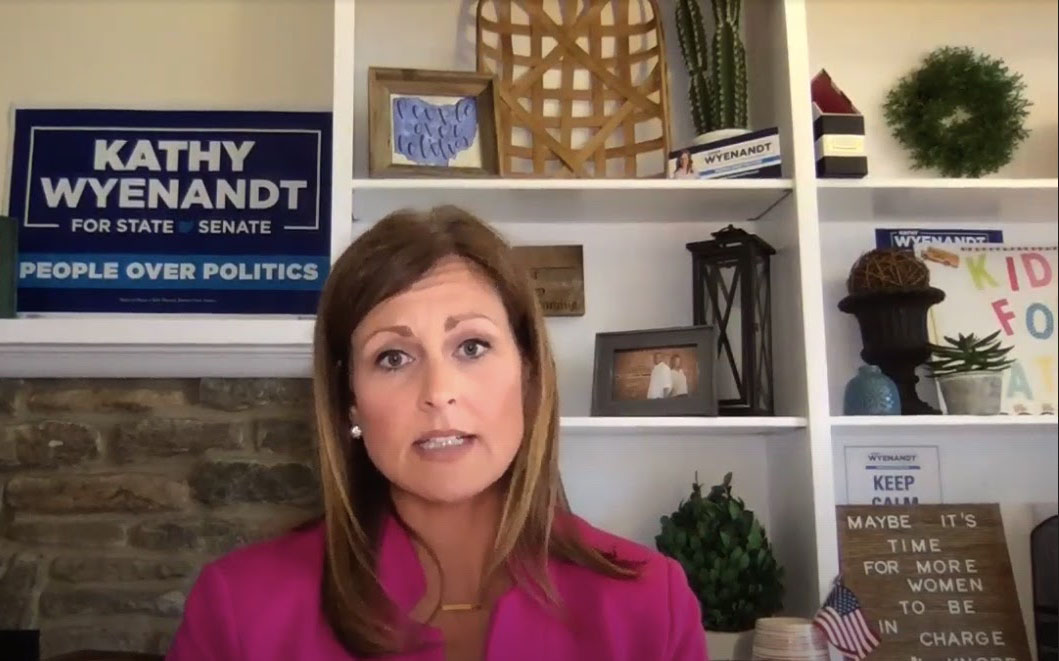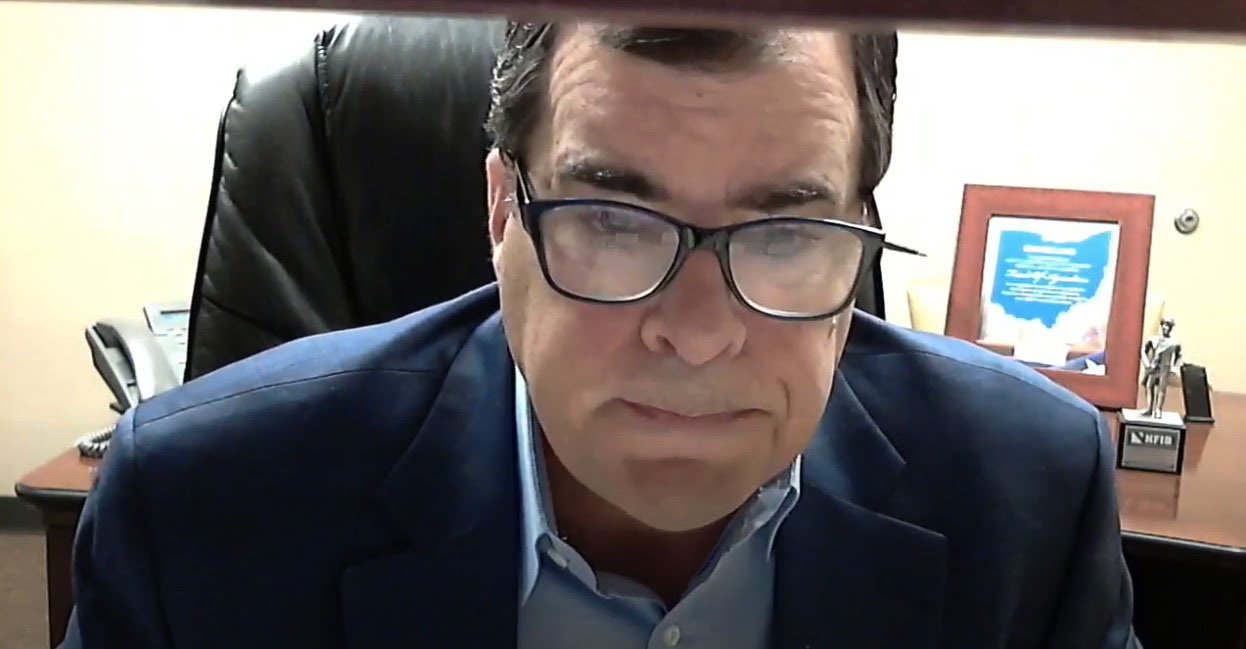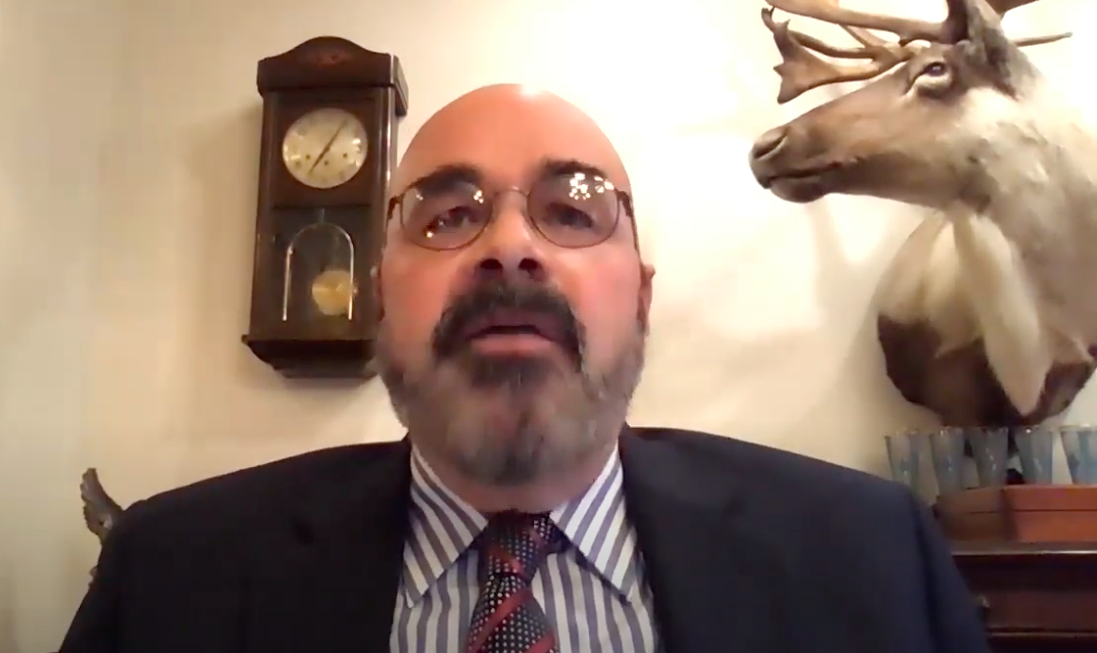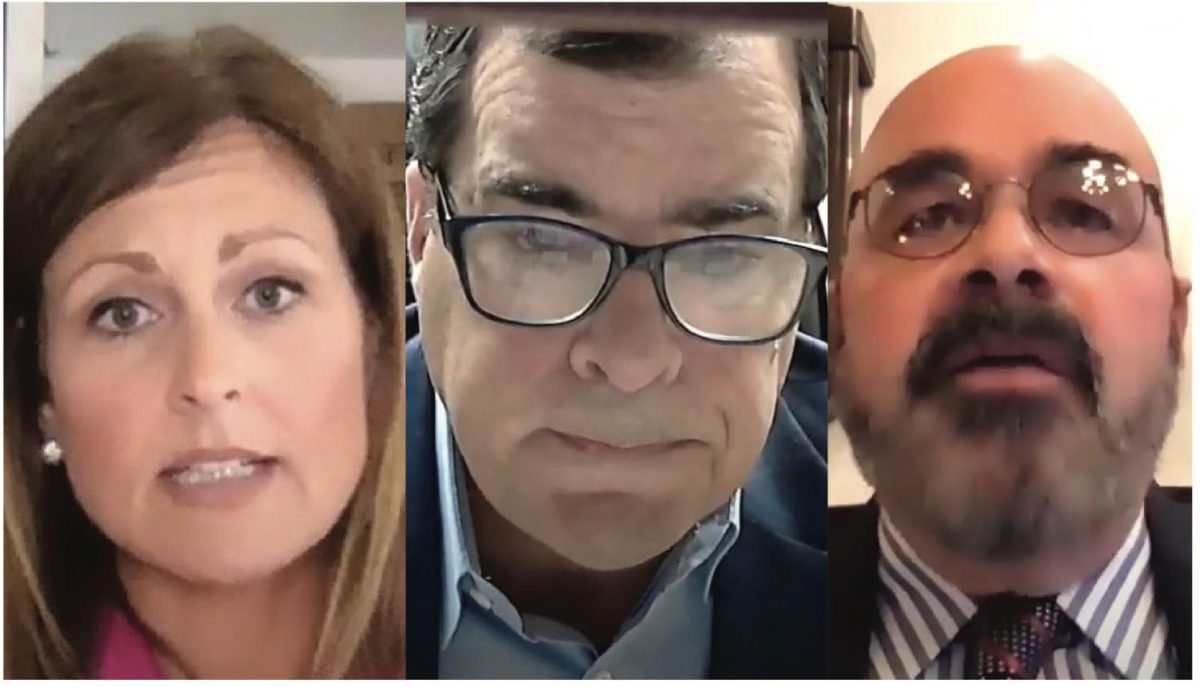Ohio State Senate District 4 candidates face off in virtual debate
September 25, 2020
The three candidates vying for the District 4 seat in the Ohio Senate debated issues ranging from health care to climate change to government corruption in a virtual debate Tuesday, Sept. 22.
Kathy Wyenandt (D), George Lang (R) and Kent Keller (Independent, write-in) faced off from separate locations on a public Zoom call to argue why each thinks they deserve the public’s vote Nov. 3.
Wyenandt, a Miami graduate with a background in sales and management, said she was motivated to get involved in local politics after three consecutive levies were defeated in Talawanda School District and school bus services were cut for her children. Two years ago, she was an unsuccessful candidate for the Ohio House.

Lang, who is finishing his term as a state representative from District 52, defeated Keller’s wife, Candace Keller, in the Republican primary. He described himself as a small businessman who believes Ohio’s taxes and regulations inhibit economic growth.

Keller, a Butler County native, described himself as a Christian Conservative, a retired project manager with American Airlines and a small business owner and farmer. He said he is running to restore honor to the state government.

District 4 includes Oxford and most of Butler County. The current senator, Republican Bill Coley, is term limited from running for re-election.
The debate was co-hosted by Jennifer Fisher, co-president of the League of Women’s Voters in Oxford; John Forren, the executive director of the Menard Family Center for Democracy and the chair of Miami University Regionals Department of Justice and Community Studies; and Michael Pitman, a staff writer at the Butler County Journal-News.
The Menard Family Center for Democracy and the Journal-News have historically hosted their own debate together, and the League of Women’s Voters in Oxford has historically hosted a candidates’ forum. However, in light of the pandemic, all three organizations collaborated to host Tuesday’s event.
“All of the local government groups are putting all their firepower behind the virtual platform,” Fisher said.
After their opening statements, Fisher, Forren and Pitman questioned the candidates about their positions on education, gun control, climate change, healthcare, government corruption and the COVID-19 pandemic. Each candidate had approximately two minutes to respond to each question.
Education
Lang said he believes the lack of business and taxpayer representation on education committees is hindering education efforts and jading financial decisions.
“The reality is, some schools are shrinking in size, and yet their budgets are still increasing,” Lang said.
Butler County public schools spend $5,681 per student, which is $3 more than the U.S. average school expenditure, according to the Butler County Chamber of Commerce.
Wyenandt used her time to show support for the proposed Ohio House Bill 305, which determines the base cost for educating students, proposes direct funding of charter schools and increases funding for economically disadvantaged students. However, she hopes revisions will be made to the bill to diversify funding away from property taxes.
House Bill 305 was introduced in June 2019 by House Speaker Robert Cupp, but has not moved forward in the legislative process.
Lang and Keller both said they support The Educational Choice Scholarship (EdChoice) Program, which provides students from designated public schools the opportunity to attend participating private schools.
Wyenandt does not support the existing mode of EdChoice, because the scholarships are not income-based.
“We need to have public oversight,” Wyenandt said. “If [private schools] receive public dollars in any way, they need to be held accountable to the same standards as their public counterparts.”
Keller said Butler County schools have the funds they need to succeed and that local school boards and administrators would be better off if they had the discretionary power to implement what they think best for their communities.
Gun control
Wyenandt said she supports universal background checks and red-flag laws that would keep people with criminal records or mental health issues from being able to acquire guns. Lang and Keller do not support any further regulations and said they would work to pass “stand your ground” laws in Ohio.
Climate change
Keller and Lang are not proponents of policies aimed at limiting climate change.
“The climate hasn’t changed much since I’ve been a kid,” Keller said. “It snows in the winter and gets hot in the summertime.”
Lang said he believes that humans impact climate change, but that the effects are “infinitesimal,” and therefore, do not need to be addressed.
Lang and Keller’s positions ignore prevailing scientific thought.
A 2016 study found that out of 4,000 peer-reviewed papers that took a position on climate change, 97% agreed with the position that human activity caused global warming. Only 27% of American adults think almost all climate change scientists agree that human behavior is mostly responsible for climate change.
Wyenandt said that humans are impacting climate change and she is interested in diversifying Butler County’s energy portfolio and expanding tax credits for solar power, wind power and energy efficient vehicles.
Health care
Lang and Keller said they are against the Affordable Care Act, claiming that it interferes with the free-market. Both candidates said they do not support an expansion of Medicaid and both are against allowing people to stay on their parents’ health programs until the age of 26.
There are 2.9 million residents of Ohio receiving Medicaid-sourced health care on a daily basis, according to the Ohio Department of Medicaid (ODM).
Lang said that Ohio is the “fifth most left-state” in the nation which contributes to its healthcare inefficiencies. Ohio ranked 39 overall as a state in the U.S. News and World Report, which does not use “leftness” as a contributing category.
Wyenandt said she would focus on addressing expanding access to mental health care and addiction treatment as well as codifying protection for coverage of preexisting health conditions.
Public corruption
In July of 2019, Ohio lawmakers approved legislation to subsidize nuclear and coal power plants with millions of dollars from the public and negate the state’s green-energy mandates for utilities.
A year later, the former Speaker of the House Larry Householder (R-Glenford) was arrested for allegedly using a 501(c)(4) organization to hide the origins of over $60 million, which was funneled to himself, his associates and his preferred political candidates in exchange for passing House Bill 6.
All three candidates agreed that HB6 was corrupt.
“(HB6) was a bailout from the beginning. Every representative that voted on that knew that it was a bailout. All the ones that took the corrupt money knew it was corrupt money,” Keller said.
Keller called out Lang for voting for HB6 and said that Lang received $745,000 in donations for doing so. However, Lang denied the claim.
“I don’t know what Mr. Keller is talking about, but I’m proud that I have so much broad support from so many businesses,” Lang responded.
“If you elect a man who’s taken kickback money, been investigated by the FBI, been sued by the West Chester Police Department, been sued for breach of contract and is even now possibly preparing again for another FBI investigation … Butler County does not need that,” Keller said in his closing argument.
Lang was acquitted of a perjury charge in February of 2011 for allegedly lying under oath in federal court during the trial of Orlando Carter, the former owner of the defunct telecommunications company Dynus.
In 2013, Lang was accused of defamation and slander by three West Chester Police officers for claiming they used excessive force while breaking up a bar fight. Lang settled for $18,000.
“I’m proud of my record as an elected official,” Lang said at the end of his closing statement.
Wyenandt said she supports the Ohio Anti-Corruption Act (HB 739), which inhibits non-profit corporations like 501(c)(4)s and limited liability companies (LLCs) from exploiting special interest loopholes, requires corporations and LLCs to disclose additional information, and bans domestic corporations with foreign owners from spending in state elections.
“Pay-to-play (politics) influences our economy,” Wyenandt said. “Twenty-five years of one-party rule has led to corruption and unaccountability (and) career politicians who are not working for us. We need to clean it up.”
COVID-19
When asked whether Ohio should have shut down in March of 2020 and whether they agreed with the state-wide mask mandate, Lang and Keller said no, while Wyenandt said yes.
“Government doesn’t have the power or authority to tell you what to eat, what to wear and how to wear it, where to go and when to go,” Keller said. “We are not children. The businesses can decide how they want to open their businesses.”
“Here’s what I want the government to do. I want them to tell us ‘these are what we perceive the risks to be, here is what we think you should do,’ and then get the hell out of the way and let us decide how we want to live our lives,” Lang said.
Wyenandt attributes the partisan divide and mask-wearing controversy to public leaders not following health recommendations themselves and setting bad examples.
“I get freedom, but with freedom comes great responsibility,” Wyenandt said.
As of Sept. 24, Butler County has reported 5,838 COVID-19 cases and 110 COVID-19 related deaths.














